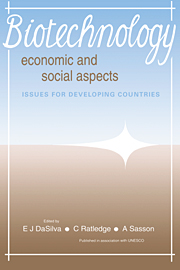Book contents
- Frontmatter
- Contents
- List of contributors
- Preface
- 1 Biotechnology: the socio-economic revolution? A synoptic view of the world status of biotechnology
- 2 Bioethanol production: economic and social considerations in failures and successes
- 3 Biofertilizers: agronomic and environmental impacts and economics
- 4 Microalgal biotechnology: is it an economic success?
- 5 Production of useful biochemicals by higher-plant cell cultures: biotechnological and economic aspects
- 6 Mushroom production – an economic measure in maintenance of food security
- 7 The economic viability of Single Cell Protein (SCP) production in the twenty-first century
- 8 The impact of biotechnology on international commodity trade
- 9 Biotechnology: socio-economic considerations, intercultural perspectives and international viewpoints
- 10 Joint microbial biotechnological ventures in developing countries: social promises and economic considerations
- 11 The economic and social implications of gene technology to developing countries
- 12 Making biotechnology appropriate – and environmentally sound
- 13 Information support for research and development in biotechnological applications
- 14 The effects of emerging biotechnologies on plant and animal agriculture – a viewpoint
- Index
1 - Biotechnology: the socio-economic revolution? A synoptic view of the world status of biotechnology
Published online by Cambridge University Press: 04 August 2010
- Frontmatter
- Contents
- List of contributors
- Preface
- 1 Biotechnology: the socio-economic revolution? A synoptic view of the world status of biotechnology
- 2 Bioethanol production: economic and social considerations in failures and successes
- 3 Biofertilizers: agronomic and environmental impacts and economics
- 4 Microalgal biotechnology: is it an economic success?
- 5 Production of useful biochemicals by higher-plant cell cultures: biotechnological and economic aspects
- 6 Mushroom production – an economic measure in maintenance of food security
- 7 The economic viability of Single Cell Protein (SCP) production in the twenty-first century
- 8 The impact of biotechnology on international commodity trade
- 9 Biotechnology: socio-economic considerations, intercultural perspectives and international viewpoints
- 10 Joint microbial biotechnological ventures in developing countries: social promises and economic considerations
- 11 The economic and social implications of gene technology to developing countries
- 12 Making biotechnology appropriate – and environmentally sound
- 13 Information support for research and development in biotechnological applications
- 14 The effects of emerging biotechnologies on plant and animal agriculture – a viewpoint
- Index
Summary
Introduction
Biotechnology is many things to many people. Traditionalists would tell us that biotechnology is one of the oldest activities of man, beginning with the production of wines and alcoholic beverages and now encompassing all of the current fermentation industries. Modernists would suggest that biotechnology came of age with the advent of recombinant DNA technologies and it is this ‘new’ biotechnology which will have the greatest impact upon our societies and their economic structures. The reality, of course, is that both these views, the traditional and modern, are inter-dependent. The new biotechnology could not have gained such a rapid place in the industrial fabric of society had there not been the traditional roots already in place. Developments and indeed applications of genetic modifications of living cells have taken place because of the traditional view that microorganisms have much to offer in their exploitation to man's well-being. A coherent framework, thus, was already in place which then allowed genetic engineering principles to be speedily translated from laboratory concepts into industrial practices.
The implications for biotechnology in a developed and developing world are tremendous. However, it must always be appreciated that biotechnology is what it says it is: it is a technology. That is, it is an enabling discipline. It allows the exploitation of microorganisms, plant and animal cells to take place within an economic framework. Biotechnology is not then a science: it is a means of applying science for the benefit of man and society. In practice, this means that biotechnology is used to make money – or in certain instances – to save money.
- Type
- Chapter
- Information
- Biotechnology: Economic and Social AspectsIssues for Developing Countries, pp. 1 - 22Publisher: Cambridge University PressPrint publication year: 1992

